Pond’s Jay Watson on the search for improv gold, the freedom to make weird noise and why lead guitar rules
The multi-instrumentalist unpacks the Australian psych-rocker’s freewheeling sound and explains why they don’t need rhythm guitars to make a guitar album

They’re a hip Australian collective whose fun, imaginative music blurs the boundaries between synth-pop, prog, psych and rock. When they tour, they’re equally at home on a Glastonbury stage or headlining a sold-out club night of their own.
Some members also play with fellow Perth star Kevin Parker, AKA neo-psych act Tame Impala. Their early works led to inevitable comparisons with early Pink Floyd, but a French music blog once described a tune of theirs as a ‘Lenny Kravitz nightmare’. It’s hard to judge where Pond land on the musical spectrum. Maybe their own multi-instrumentalist Jay Watson can help?
“I suppose it depends which way you look at it,” he muses from his home studio in Perth. He’s surrounded by vintage synths, guitars, and piles of effects pedals teeter on his shelves.
“Pond are either an incredibly successful band that makes basically pop music, or a very strange band that’s deliberately obtuse for the sake of it. With every record we try and make the songs better, but also we try and make them more and more messed up, because that’s what we like.”
That’s certainly true of their ninth, self-produced album. Following on from 2019’s acclaimed Tasmania, 9 sees Pond – Watson, singer/guitarist Nick Allbrook, guitarist Joe Ryan, keyboardist Jamie Terry and drummer James Ireland – on powerful creative form.
From psych- and harmony-soaked opener Song For Agnes to trippy, guitar-led closer Toast, this is a refreshing dip into their unique sound-world, one born of old-fashioned jamming, modern editing, piles of weird gear and a ton of good ideas.
Pond are either an incredibly successful band that makes basically pop music, or a very strange band that’s deliberately obtuse for the sake of it
“We were keen on this one not having a theme, like the last couple did,” Watson explains. “Sometimes it’s much more fun to just throw shit at the wall and see what sticks. But to make that work we were ruthless with the editing.
Get The Pick Newsletter
All the latest guitar news, interviews, lessons, reviews, deals and more, direct to your inbox!
“In the past we’d get asked to do radio edits of our songs – chopping a six-minute song down to three minutes 40 – and almost every time we’d say, ‘This is way better, why don’t we just do that?’ So when we were mixing 9, we went for maximum economy. It’s not a punk record, but we wanted that punk feeling. Even the title’s short, and the whole album’s just 40 minutes.”

At the studio they laid down tracks on a 16-track tape machine. They’d record for 15 minutes, flip the tape over, record for another 15, then dump the results into Pro Tools, erase the tape and start again.
“This was pure jamming,” says Watson, “which we hadn’t done in eight years or so. But improvising’s not easy, and 95 per cent of it was just shit. Our aim was to find loops, like a four- or eight-bar thing, then sample that and make something out of it.”
From this process emerged some fascinating, seemingly amorphic pop. The funky America’s Cup is based on an eight-bar loop from their jam sessions, and its Bowie, white-soul vibe comes with a nicely messed-up guitar line that Joe Ryan cooked up during the jam.
“It’s funky and discordant,” says Watson. “Joe uses this blue Telecaster that Fender gave him, and he has this TC Electronic chorus and flanger from the '90s on there. It’s cool and amusing – it’s easier to work on something for hours if you find it a bit funny. It keeps you going.”
The first half of Czech Locomotive is moody and echoing, with Allbrook’s guitar going through a Chase Bliss Audio MOOD reverb/delay/micro-looper pedal, and a tiny yellow Abracadabra delay/reverse unit by Japanese company Bananana Effects. The second half is an uplifting, sunny rock song given character by Ryan’s insistent, pleasing two-note solo on the outro, pushed through a vintage Ace Tone Stereo Phaser.
Listening again to Pond’s explosive 2008 debut Psychedelic Mango, 2012’s superb Beard, Wives, Denim, even 2018’s The Weather (containing their signature streaming hit Paint Me Silver), their overall use of guitars seems to have become more economic over time, too.
“As a young band we used to write on guitar,” says Watson, “and fill out the sound of the band with guitars. But now we rarely put them in just for the hell of it. On Tasmania there’s almost none in the backing music, but almost every song has some sort of lead guitar. We’re really into twin lead guitar lines. Live, Nick won’t play guitar at all then pick it up and do a solo, then put it down – it’s a Prince-inspired thing. But we do like the sound of almost hair-metal guitar over synthesisers.”
The guitar Allbrook usually reaches for is his trusty Fender Mustang, and a big part of the Pond live sound is his Boss Harmonist pitch shifter pedal (“He uses the sweep setting to go two octaves up,” Watson explains, “but you can set the time it takes the portamento to get there.”)
Joe Ryan relies on the robust simplicity of the Telecaster, and while Watson plays bass in concert, on the records he gets involved with drums (his playing on Take Me Avalon I’m Young is superb), synths (as on the wonky, Jacko-meets-trance-meets-The Clash track Pink Lunettes), and guitar, too.
“The main chuggy guitar on Human Touch is a cheap '60s Teisco Kent into a Latent Lemon Audio clone of the Maestro Brassmaster fuzz, which are stupidly expensive these days. We wanted a sound like that with the energy of rock music, but not actually that rocky. My freakout solo is on the favourite guitar I own, a Vox Starstream. It has a built-in wah-wah, fuzz, tremolo repeater thing, and a treble boost so you can get instant feedback really easily.”
Wherever they land on the spectrum, Pond’s creativity lies in this liberating, feverish, no-chords-barred free-for-all among friends. Watson agrees: “The best thing about Pond is that freedom to do whatever we want. We want to be as appealing as possible to everyone, while cramming as many ridiculous noises into it as we possibly can.”
- 9 is out now via Spinning Top Records.
Grant Moon is the News Editor for Prog magazine and has been a contributor to the magazine since its launch in 2009. A music journalist for over 20 years, Grant writes regularly for titles including Classic Rock and Total Guitar, and his CV also includes stints as a radio producer/presenter and podcast host. His first book, Big Big Train - Between The Lines, is out now through Kingmaker Publishing.
“I suppose I felt that I deserved it for the amount of seriousness that I’d put into it. My head was huge!” “Clapton is God” graffiti made him a guitar legend when he was barely 20 – he says he was far from uncomfortable with the adulation at the time
“I was in a frenzy about it being trapped and burnt up. I knew I'd never be able to replace it”: After being pulled from the wreckage of a car crash, John Sykes ran back to his burning vehicle to save his beloved '76 Les Paul










